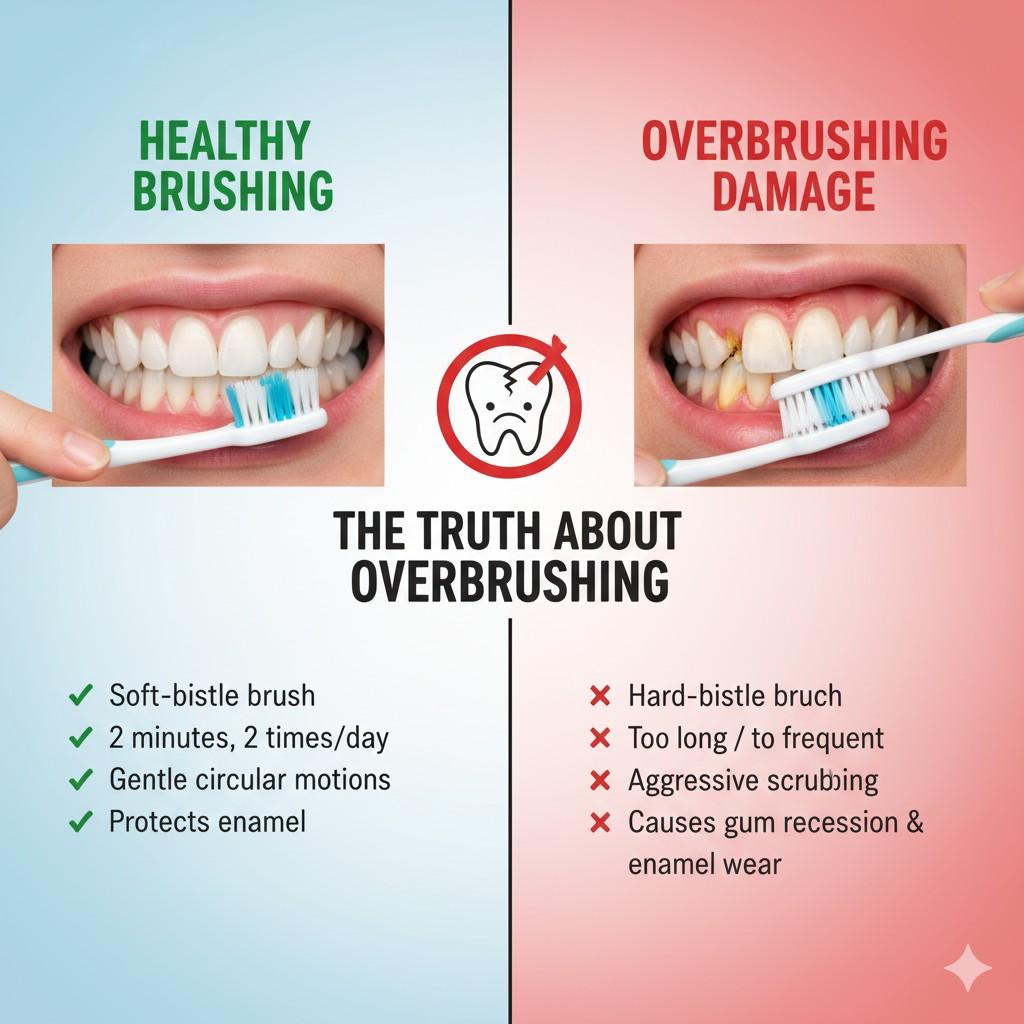For many people, brushing their teeth is an essential part of their daily routine—and with good reason. Brushing removes plaque, prevents cavities, and helps maintain fresh breath. But is there such a thing as brushing too much? Can overbrushing actually harm your teeth and gums?
At Fraser Point Dental, we often get questions from patients concerned about whether their brushing habits are helping or hurting their oral health. In this article, we’ll explore the truth about overbrushing—what it is, how it happens, and how you can maintain the right balance for a healthy, happy smile.
What Is Overbrushing?
Overbrushing refers to brushing your teeth too often, too hard, or with the wrong technique. While it might seem like brushing more frequently would keep your teeth cleaner, overbrushing can actually damage your teeth and gums.
The key to healthy teeth isn’t brushing harder or longer—it’s brushing correctly and consistently.
Signs and Risks of Overbrushing
If you’re overbrushing, you might notice some of these warning signs:
- Gum Recession: Aggressive brushing can cause your gums to pull away from the teeth, exposing sensitive tooth roots.
- Tooth Sensitivity: When gums recede or enamel wears away, teeth can become sensitive to hot, cold, or sweet stimuli.
- Enamel Erosion: Brushing too hard or with an abrasive toothpaste can wear down the protective enamel layer on your teeth.
- Sore or Bleeding Gums: Overbrushing can irritate your gums, causing soreness and bleeding.
- Toothbrush Abrasion: Visible notches or grooves near the gumline can develop from excessive brushing pressure.
How Often Should You Brush?
The American Dental Association (ADA) recommends brushing twice a day for two minutes each time. Brushing more than this—such as after every meal—can be unnecessary and potentially harmful, especially if you’re brushing aggressively.
What Causes Overbrushing?
Several factors can contribute to overbrushing:
- Using a Hard-Bristled Toothbrush: Hard bristles can be abrasive to your gums and enamel. The ADA recommends using a soft-bristled toothbrush.
- Brushing Too Hard: Some people think more pressure cleans better. In reality, brushing with excessive force damages your gums and enamel.
- Incorrect Technique: Brushing horizontally with a scrubbing motion is more likely to cause damage than gentle, circular strokes.
- Overzealous Oral Care: Sometimes, overbrushing happens because of anxiety about oral health or trying to remove stubborn stains or plaque.
How to Brush Correctly to Avoid Overbrushing
To protect your teeth and gums while effectively removing plaque, follow these tips:
- Use a Soft-Bristled Toothbrush: A soft brush cleans effectively without harming your enamel or gums.
- Use Gentle Pressure: Hold your brush like a pencil and apply just enough pressure to feel the bristles against your gums and teeth—about the pressure of a fingernail.
- Use Proper Technique: Angle the brush at 45 degrees to the gumline, and use small, circular or elliptical motions rather than back-and-forth scrubbing.
- Brush for Two Minutes Twice Daily: Set a timer or use a toothbrush with a built-in timer to ensure adequate cleaning without overdoing it.
- Replace Your Toothbrush Every 3-4 Months: Worn bristles are less effective and may encourage more forceful brushing.
What About Brushing After Eating?
While brushing after meals may sound like a good idea, brushing immediately after acidic foods or drinks can actually harm your enamel. Acid softens the enamel temporarily, and brushing right away can wear it down.
If you want to freshen your mouth after eating, rinse with water and wait at least 30 minutes before brushing.
What to Do if You Think You’re Overbrushing
If you’re experiencing sensitivity, gum recession, or bleeding gums, it might be time to adjust your brushing habits. Here’s what you can do:
- Switch to a softer toothbrush and gentle technique.
- Use desensitizing toothpaste if sensitivity is an issue.
- Avoid abrasive whitening toothpastes or gels.
- Schedule a visit at Fraser Point Dental to have your teeth and gums evaluated.
- Talk to your dental hygienist about your brushing technique and get personalized advice.
How Can Fraser Point Dental Help?
If you suspect that overbrushing is damaging your smile, don’t hesitate to reach out. At Fraser Point Dental, we’ll:
- Assess your oral health and identify any damage caused by overbrushing.
- Show you the proper brushing technique in a hands-on demonstration.
- Recommend toothbrushes, toothpaste, and oral care products that are gentle yet effective.
- Provide treatments for sensitivity or gum recession if needed.
- Help you build a balanced, effective oral hygiene routine.
Final Thoughts
Brushing your teeth is a vital part of oral health—but it’s not a case of “the more, the better.” Overbrushing can lead to gum recession, enamel wear, and tooth sensitivity, causing more harm than good. By brushing gently twice a day for two minutes with a soft-bristled toothbrush, you can keep your smile healthy and bright without risking damage.
If you have concerns about your brushing habits or oral health, Fraser Point Dental is here to help. Book your appointment today and let us guide you toward the right oral care routine for your unique needs.

Dr. Kalirai, DMD, was born in Prince George, British Columbia before moving to Vancouver in 1994 to attend the University of British Columbia. He was accepted into the UBC School of dentistry immediately following his BSC.
Dr. Kalirai enjoys playing tennis, working out, Tae-Kwon-Do, and spending quality time with his wife Lisa, and 2 daughters. He continues to be involved in Tae-Kwon-Do after receiving his black belt at age 16 and winning 2 gold medals in a row at the provincial and national levels.
Request an Appointment

